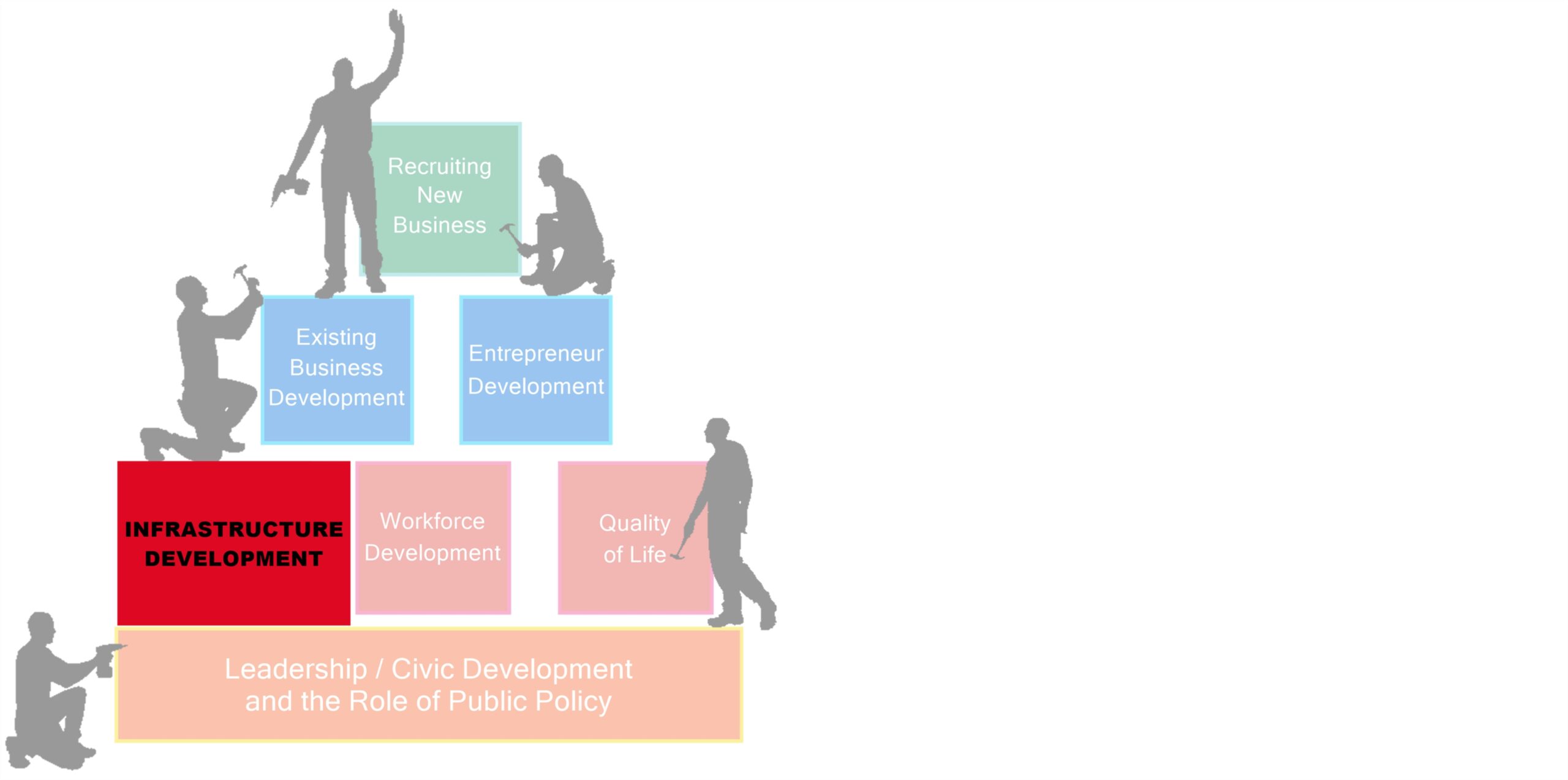In our continuing effort to articulate the “Plan” of Forward Cody, keep in mind the “Building Blocks” image and how these pieces fit in place. Our second tier constitutes three items which are essential for business growth. They are Infrastructure, Workforce and Quality of Life. As with the discussed Leadership topic, economic development cannot and will not occur without these three critical elements. Our role is to work with the local government to insure these are in place and when needed, participate in making improvements.
Now while I’d love to jump into a discussion about all three at one time-I think most people realize that each of these building blocks would take pages to discuss. For that reason, we’ll address each one separately. So, let’s start with infrastructure!
At its core, infrastructure includes things like water, sewer, power, gas, transportation, and communication networks. I usually term these elements as the things we don’t think about until they don’t work. These systems enable users to enjoy the benefits of these improvements, without having to do much more than pay to use them. Imagine for a moment if you were required to maintain each of the systems that you use. It should make writing that utility or tax check pretty easy.
Cody, and for that matter all of Park County, are blessed with well managed and maintained city services. As you know, the City of Cody handles all water, wastewater, storm water and electric utilities for residents in the community. Most of these are typical services offered by a municipality. It’s one of the primary reasons for forming a local government, essentially to do for people what they would rather not do themselves. Our communications and natural gas utilities are provided by private, independent companies.
So why is infrastructure so critically important to economic development? Think about what is necessary for a company to manufacture a product. It starts with acquiring raw materials. But how do they get to your home or place of business? Through a network of transportation and national highways that allow freight to be conveyed quickly and inexpensively to your doorstep. It’s of no small coincidence that our town’s founder Buffalo Bill, started a freight company as one of his first enterprises. OK, you have acquired raw material. As you enter your factory to begin your manufacturing process, you flip the switch and turn on the lights. Oh yes, and the switch on the processing equipment too. You also probably like to be warm, so you adjust the thermostat too. The electric power running through that network of cables and the gas running to your furnace are part of a complex system of wires and pipes designed to provide the voltage or thermal units of energy that you need when you need it. Most of us don’t realize how amazing that is until the power goes out!
So, your warm, well-lit building allows you to begin producing a product. Most processes require at some stage, the use of water. That use also necessitates the need for wastewater. Whether it be for use in the manufacturing process or simply for sanitary use by employees, the pipes that bring the water in and those that take the wastewater away are part of another complex network of infrastructure. If you think things get crazy when you don’t have power, try interrupting the water or worse yet wastewater service for a while. These key, but seldom considered, services are extremely important to our ability to conduct business.
And it doesn’t stop there. Your product is complete, and you need to get it to market. But just how does your customer know about your product or contact you about acquiring product? That becomes yet another item of infrastructure – the communications network. We’ve grown quite dependent on the quick phone call from anywhere or that text or email message to communicate immediately with the entire world. That connection ties us to customers everywhere and instantaneously. It’s changed the way we do business and will change it even more in the future.
So, your transaction is completed – the customer has ordered and paid you online – all you have to do is get the product to them. Again, our transportation infrastructure kicks in. Do you send your product via overland freight? Do you send it by air? We have choices! And are blessed to have them, for even at the end of the secondary road in northwest Wyoming, we can ship a product out and have it delivered to the farthest reaches of this country just a few days. That should amaze every one of us, because it truly is amazing!
Economic development relies heavily on each of the systems. As a business looks to grow or to relocate, key questions must be answered regarding each of these infrastructure items. Part of our role as economic developers, is to understand the capacity of the systems and work with the providers to ensure that they are continually maintained and keeping up with growth.
Development follows infrastructure, which is to use the catch phrase, “if you build it, they will come”. While many may view this statement as wishful thinking, what it means at its core is if you make your community ready for development, it will happen.
Cody is blessed to have high quality, private utility suppliers and a Public Works department in the City who have their eyes on the future and are constantly positioning our community for success.




